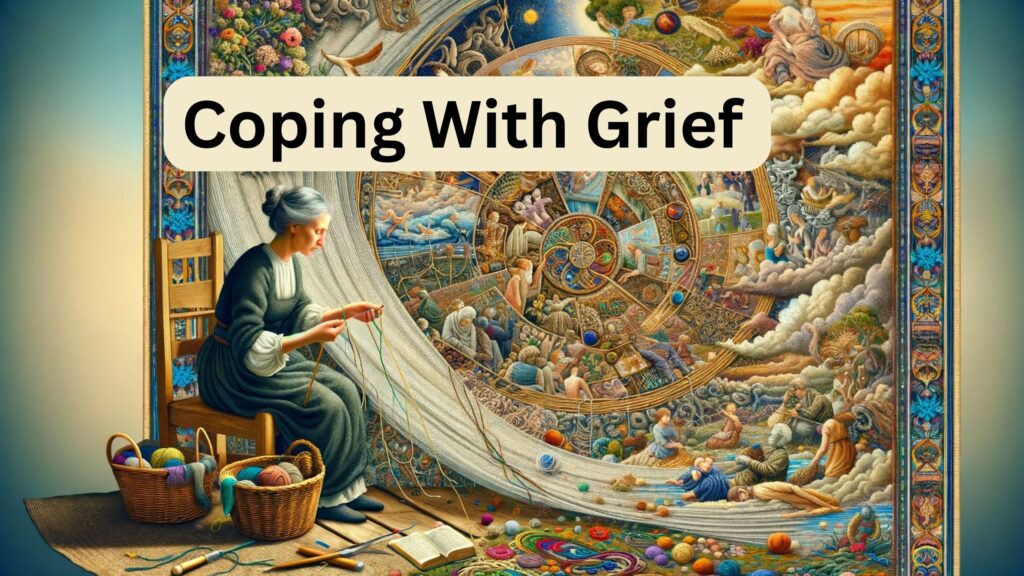Grief is a relentless storm that sweeps through our lives, leaving a trail of pain, confusion, and heartache in its wake. In my work as a professional medium, I’ve witnessed the profound impact that grief can have on individuals and families.
I have witnessed grief overtake a person’s life and I have witnessed grief to be the catalyst to deep soul-profound ways of being. While grief may never fully disappear, there are coping strategies that can help you navigate its tumultuous waters with resilience and compassion. In this article, we’ll explore essential steps to cope with grief, offering a guiding light amidst the darkness.
Coping Strategies for Grief: Navigating the Storm with Resilience and Compassion

I like to compare grief to an intricate tapestry of life. Every thread represents an emotion, a memory, a moment shared, and a love experienced. With each new chapter of life, this masterpiece is weaving together the strands of sorrow, anger, nostalgia, and even moments of unexpected joy.
Imagine your grief journey as the creation of a beautiful intricate tapestry. Each emotion, thought, and memory is a thread woven into the fabric of your experience. There will be threads that are bright and vibrant, representing moments of happiness and connection.
There will also be darker threads, symbolizing the depths of your sorrow and loss. When stepping back to look at the tapestry as a whole, the duality of light and dark brings a flawless, unique, and perfect masterpiece.

Just as a tapestry becomes more intricate and beautiful with each added thread, your grief journey gains depth and richness as you express your feelings. Every tear shed, every shared memory, and every conversation about your grief contribute to the evolving masterpiece of your experience.
Honoring your experience is not about erasing the pain of grief but acknowledging that it is an integral part of your story. It’s about recognizing that your grief tapestry is a reflection of the profound love and connection you had and that by expressing your feelings, you are preserving and honoring the essence of what was lost. To fully embrace the tapestry of grief, here are 8 steps of grief.
The first step in coping with grief is to acknowledge its presence. Give yourself permission to grieve and recognize that it’s okay to feel the emotions that come with loss. Whether it’s sadness, anger, guilt, or a complex mix of feelings, allow yourself to experience them without judgment. Suppressing grief and emotions can have detrimental effects on your mental and physical well-being. It may lead to prolonged distress, increased anxiety, and even physical health issues.
You are not your experiences. You are not emotional. You are not your current life situation. Yes, you are here experiencing this right now… but it doesn’t define who you truly are. While we may be here in this physical world, we are so much more than this physical body. We are infinite eternal cosmic beings. We chose to come to the world at this time to expand and awaken to our true selves.
Having the remembrance that we are more than our bodies and that what feel or think does not define us, quickens our awakening. This higher perspective assists us through the challenges we face on this human journey.
Grief doesn’t have to be endured in isolation. Reach out to friends, family, support groups, or professionals who can provide understanding and empathy. Grief is a healing process, and reaching out for extra support is a vital step in that process. It allows you to confront the pain, adjust to the new reality, and eventually find a way to move forward while preserving the memory of what was lost.

When you allow yourself to express your grief openly, whether through talking, writing, or creative outlets like art or music, you provide a channel for emotional release. Talking about your feelings and experiences can be incredibly therapeutic and help you realize you’re not alone in your journey.It is important to find healthy outlets for expressing your emotions. Expressing your feelings allows you to process and release these emotions healthily and constructively.
In essence, expressing your feelings during grief is like weaving a tapestry of remembrance, a living tribute to the love that remains even in the face of loss. Embracing this tapestry, with all its intricate threads, is a powerful way to honor your unique journey through grief. It allows you to find meaning amid sorrow and to remember that your experience is a testament to the depth of your love and the resilience of your spirit.

During times of grief, self-care becomes paramount. Prioritize your physical, mental, emotional, and spiritual well-being. This is done by maintaining healthy foods, engaging in regular movement, and getting sufficient sleep. Your body is your greatest vessel.
During heavy phases of grief, getting out of bed might be all you can muster up for the day, but that too will pass. Do what you can to take care of your body. It is suggested to find things that you can do as a self-care practice that brings joy.
Mindfulness practices like meditation can also help calm the mind and reduce stress. During different seasons in life, certain self-care practices may call to you.
They can also change frequently. I invite you to reflect on your self-care needs with loving curiosity and an open heart. You might explore new passions you didn’t even know you had! And for you moms and dads out there… Taking care of yourself is the BEST thing you can do for your family. If you are filled, it is impossible to fill your loved ones.
Establishing rituals or memorials in honor of your loved one can provide a sense of connection and closure. Lighting a candle, planting a tree, or creating a memory box are all ways to keep their memory alive and celebrate their life.
To those who are worried or overwhelmed, feeling your loved ones’ memories, touch, voice, and smell fade away. You are heard. You are loved. You are not alone. The most painful and real rude awakening is when the memories start to fade away; a huge message to share over and over is THEY WILL NEVER BE FORGOTTEN.

For those who are spiritually inclined, seeking solace in your beliefs can be a source of comfort. Engage in practices that align with your faith or explore spiritual connections through meditation or prayer. If what you have been doing isn’t fulfilling any longer, permit yourself to connect to your spiritually in ways that feel safe and fun. Embracing your spirituality is a coping strategy that can provide profound comfort and support during the grieving process.
For many individuals, spirituality is deeply intertwined with their sense of meaning and purpose in life. During times of grief, when life’s meaning may be challenged, turning to spiritual beliefs and practices can offer a sense of grounding and reaffirmation of one’s purpose in the face of loss.
Spirituality can be a source of hope and resilience. Believing in a higher power or a spiritual connection can offer reassurance that there is something beyond the pain of grief, and it can inspire hope for healing and renewal. Embracing spirituality is a deeply personal journey. Whether you follow an organized religion or have your own spiritual beliefs, this journey is unique to you. It can be a source of inner strength and a way to make sense of the profound emotions that accompany grief.
If your grief becomes overwhelming or leads to mental health concerns like depression or anxiety, don’t hesitate to seek professional help. Therapists, counselors, or grief specialists can provide specialized support and guidance. Remember, asking for help is a sign of great strength.
Grief is not a linear process, and healing takes time. Be patient and kind to yourself as you navigate the ups and downs of grief. Understand that it’s normal to have good days and bad days, and there is no set timeline for recovery.
When you are kind about your grief journey, you are like a skilled weaver, carefully adding each thread to the tapestry. As you honor your experience by acknowledging the significance of each thread, no matter its color or texture.
You recognize that every emotion, whether painful or comforting, is a testament to the love and connection you shared with the person or thing you’ve lost.

In conclusion, coping with grief is a profound and deeply personal journey. By acknowledging your grief, seeking support, and practicing self-care, you can navigate this challenging path with resilience and compassion. Remember that you are not alone, and healing is possible.